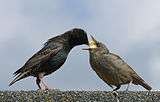Xenophagy
Xenophagy (Greek "strange" + "eating") and allotrophy (Greek "other" + "nutrient") are changes in established patterns of biological consumption, by individuals or groups.
• In entomology, xenophagy is a categorical change in diet, such as an herbivore becoming carnivorous, a predator becoming necrophagous, a coprophage becoming necrophagous or carnivorous, or a reversal of such changes.[1] Allotrophy is a less extreme change in diet, such as in the case of the seven-spot ladybird, which can diversify a diet of aphids to sometimes include pollen.[2] There are several apparent cases of allotrophy in Israeli Longitarsus beetles.[3]
• In microbiology, xenophagy is the process by which a cell directs autophagy against pathogens, as reflected in the study of antiviral defenses.[4] Cellular xenophagy is an innate component of immune responses,[5] though the general importance of xenophagy is not yet certain.[6][7][8]
• In ecology, allotrophy is also reflected in eutrophication, being a change in nutrient source such as an aquatic ecosystem[9][10][11] that starts receiving new nutrients from drainage of the surrounding land.[12]
References
- Insects and plants: parallel evolution and adaptations - Page 29 Pierre Jolivet - 1986 "Xenophagy is a complete change in diet, the herbivorous diet becoming carnivorous or vice versa, predators becoming necrophagous, coprophages becoming necrophagous or carnivorous, and so on."
- Sven Erik Jørgensen Encyclopedia of Ecology: P-S Page 2924 2008 "Allotrophy is also widespread among insects, an example being the 7-spot ladybird, whose diet is mainly based on aphids (plant lice) but often includes pollen, too."
- Israel journal of entomology Volumes 12-14 - Page 138 Entomological Society of Israel - 1978 "Jolivet (1953, 1967, and in litt., 1976) has used the term allotrophy for the cases where a beetle is found to feed on a completely unrelated host from its normally ... There are several apparent cases of allotrophy in Israeli Longitarsus (Table 1). "
- Fernando E. Vega, Harry K. Kaya Insect Pathology Page 470 - 2012 "The process whereby the cell directs its autophagy machinery toward killing pathogens is termed xenophagy (Levine, 2005). Xenophagy is thought to play a role in antiviral defenses (Sabin et al., 2010), although there are few data on these interactions. While the specific molecules controlling this process are poorly understood, they are expected to share similarities ..."
- Diane Elizabeth Alexander, Multiple functions of the herpes simplex virus type 1 Page 86 Washington University in St. Louis - 2008 "Xenophagy is proving to be an important component of the innate immune response to viral infections. Neuronal expression of the mammalian autophagy promoting protein Beclin 1 protects mice against lethal Sindbis virus encephalitis "
- John P. Greer, John Foerster, George M. Rodgers Wintrobe's Clinical Hematology Volume 2 - Page 271 2008 "The general importance of xenophagy is not yet certain. Among the key components that are transferred to the phagosome and are critical in creating an antimicrobial environment are the vacuole ATPase, NOS2, and phagocyte oxidase ..."
- Issues in Biological, Biochemical, and Evolutionary Sciences "We also find that the invasive efficiency of group A Streptococcus into cells is not altered by knockdown of VAMP8 or Vti1b, whereas cellular bactericidal efficiency is significantly diminished, indicating that xenophagy is functionally impaired."
- Baruch Velan, Avigdor Shafferman, Arie Ordentlich -The Challenge of Highly Pathogenic Microorganisms Page 31 2010 "Furthermore, studies have shown the ability of Y. pestis to survive in macrophages activated with the cytokine IFNγ. Some vacuolar pathogens appear to co-opt the process of autophagy for survival in host cells. Alternatively, xenophagy is an ..."
- Eutrophication: causes, consequences, correctives Page 53 National Academy of Sciences (U.S.) - 1969 "The allotrophy of a lake indicates the intensity of organic supply from its environment. According to the first statement, trophy should not be equated with the status of nutrient conditions, as advocated by Findenegg (1955)."
- Handbook of Inland Aquatic Ecosystem Management - Page 16 Sven Erik Jorgensen, Jose Galizia Tundisi, Takako Matsumura Tundisi - 2012 (L 1 ) “Allotrophy” (heterotrophic pathway) “Autotrophy” (autotrophic pathway)
- Productivity of world ecosystems Page 90 International Council of Scientific Unions. Special Committee for the International Biological Programme - 1975 "DEGREE OF ALLOTROPHY IN STREAMS The role of allochthonous organic matter in stream economy was ... However, the measurement of the degree of allotrophy has been attempted only recently and by a few stream ecologists.
- Academic Press Dictionary of Science and Technology- Page 80 Christopher G. Morris, Academic Press - 1992 "Thus, allotroph, allotrophy. allotrophic lake Ecology, a lake that receives organic material by drainage from the surrounding land. allotropic relating to or characterized by allotropy. Also, ALLOTROPHIC. allotropy Chemistry, the property ..."
